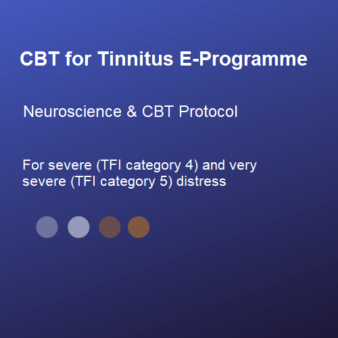Neuroscience and CBT Protocol
Published by Debbie Featherstone in About the CBT for Tinnitus E-Programme · Saturday 20 May 2023
It’s time we moved on from "change your thoughts to change how you feel." That old horse is tired and on its last legs!
Making use of the collaborative research between neuroscience and psychotherapy has brought about 100% potential for experiential change through putting natural brain plasticity to work FOR rather than against our patients, thereby revolutionising clinical practice in psychotherapy. The CBT for Tinnitus E-Programme brings these cutting edge practices to anyone suffering because of tinnitus. See Why CBT and Neuroplasticity sections.
We are forever grateful to Aaron T Beck, regarded as the father of Cognitive Behaviour Therapy, sadly lost to us in November 2021.
Watered down out-takes masquerade as "CBT" in the CBT self-help market, when in fact Beck's expansive work entailed so much more.
There is a wealth of third wave CBT practices given us, that rather than attempt to force a brain to function in ways it simply doesn’t do - see CBT & Thoughts - embraces natural brain functions helping them to work for our benefit.
The human brain is the product of ancestral survival.
We can witness the human brain’s development and the ingenious methods it employs to protect itself to promote survival, even to the point where the neocortex goes off-line when faced with danger. The more our understanding of the brain grows, so does the development of ever-improving cognitive behaviour therapies that help the brain reduce its over-compensation when “lesser-than-perceived-danger” is misinterpreted by the brain as a threat to survival thereby putting it in to survival-mode: from Yuval Noah Harari’s trilogy that begins with Sapiens: A Brief History of Humankind, to Anil Seth’s Being You: A New Science of Consciousness; from A Sixty Year Evolution of Cognitive Theory and Therapy by Aaron T Beck himself to the recent and current work of Neuro-Psychologist Dr Rick Hanson www.rickhanson.net to Dr Steven C Hayes, www.stevenchayes.com the originator of Acceptance and Commitment Therapy (ACT), evidenced-based and empirically supported by numerous organisations worldwide including the World Health Organisation and NICE (National Institute for Health and Care Excellence) in the UK.
In addition to the above, there is a mountain more from which to draw. That mountain is the enormous body of work from the trauma field, so recently overhauled through what has been learned through neuroscience and fMRI, not least thanks to the work of Dr Bessel van der Kolk among many trauma experts, and more recently the work of Dr Stephen Porges and Polyvagal Theory, and Deb Dana, Licensed Clinical Social Worker, clinician and consultant specialising in work with trauma, who has adapted the theory for therapeutic purposes.
When we have such a wealth of information to draw from, including the cited examples yet not limited to them alone, why would and why should we be satisfied with the old horse that is on its last legs?
Answer: We don’t have to. All the above led to the formulation of a Neuroscience & CBT Protocol developed for severe (TFI category 4) and very severe (TFI category 5) tinnitus distress that is the CBT for Tinnitus E-Programme.
Your Tinnitus Functional Index (TFI) indicates the number of 1-1 appointments you are likely to need. 80% of those enrolling in the programme are starting out with either a category 4 or 5 TFI. On average, two appointments are needed when starting with category 4 or 5. The remaining 20% start out with a category 3 TFI and rarely require more than the one appointment included in enrolment.
Go to CBT4T website
0
reviews


